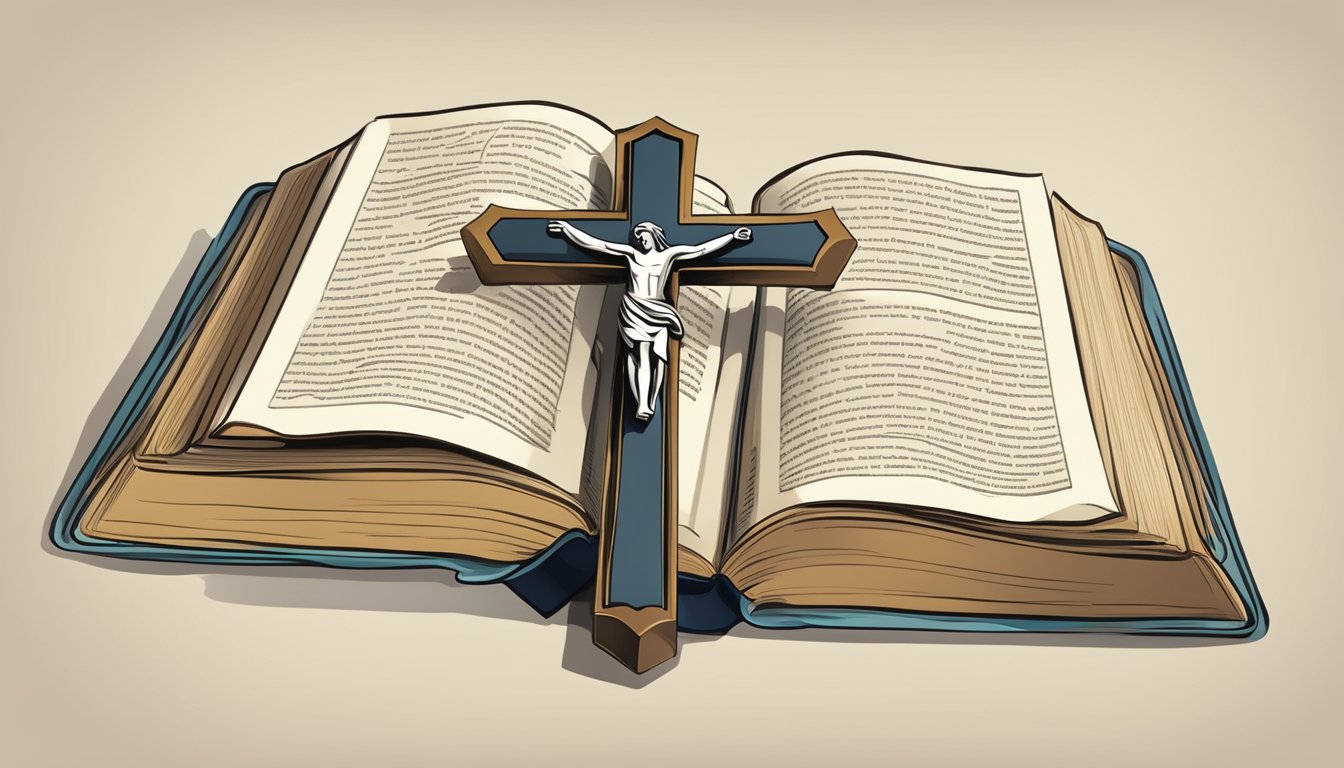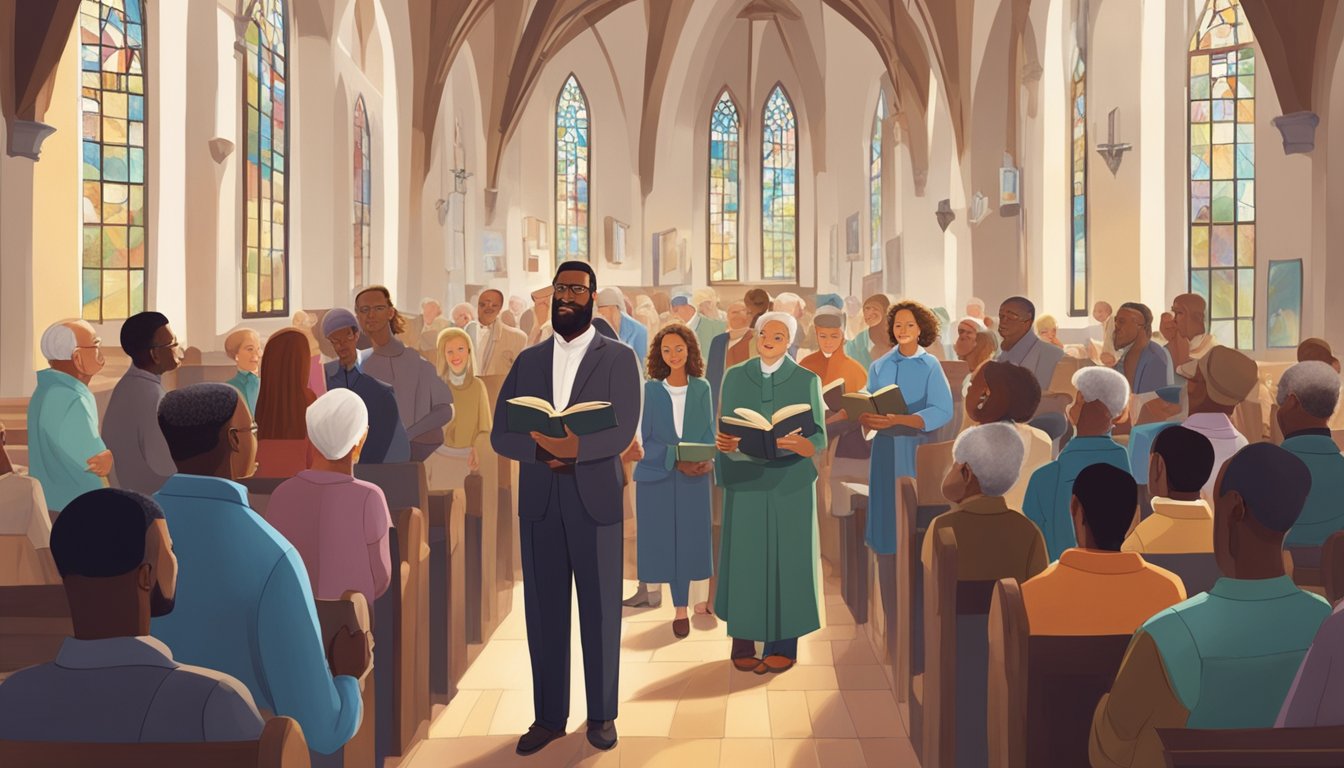Many people use the terms “Christian” and “Protestant” interchangeably, but are they really the same thing? The answer is no, but the relationship between the two is complex and can be confusing. Christianity is a broad term that encompasses a wide range of beliefs and practices, while Protestantism is a specific branch of Christianity that emerged in the 16th century as a result of the Reformation.

To understand the difference between Christianity and Protestantism, it’s important to first understand what Christianity is. At its core, Christianity is a religion based on the life and teachings of Jesus Christ. Christians believe that Jesus is the Son of God and that he died on the cross to save humanity from sin. Christianity has many different denominations, including Catholicism, Orthodox Christianity, and Protestantism.
Protestantism is a branch of Christianity that emerged in the 16th century as a result of the Reformation. The Reformation was a period of religious upheaval in Europe that began with Martin Luther’s 95 Theses, which challenged the teachings and practices of the Catholic Church. Protestants broke away from the Catholic Church and formed their own denominations, which include Lutheranism, Calvinism, Anglicanism, and many others. Protestants have different beliefs and practices than Catholics and Orthodox Christians, which has led to some theological and cultural differences between the three branches of Christianity.
Key Takeaways
- Christianity is a broad term that encompasses a wide range of beliefs and practices, while Protestantism is a specific branch of Christianity that emerged in the 16th century as a result of the Reformation.
- Protestants broke away from the Catholic Church and formed their own denominations, which include Lutheranism, Calvinism, Anglicanism, and many others.
- Protestants have different beliefs and practices than Catholics and Orthodox Christians, which has led to some theological and cultural differences between the three branches of Christianity.
Understanding Christianity

https://www.youtube.com/watch?v=qqJDmFN7KBw&embed=true
Origins and Beliefs
Christianity is a monotheistic religion that is centered around the life and teachings of Jesus Christ. Christians believe that Jesus is the Son of God and that he died on the cross to save humanity from sin. The religion has its roots in Judaism and emerged in the 1st century AD.
The central belief of Christianity is that God sent his son Jesus to save humanity from sin. Christians believe that faith in Jesus is the key to salvation and eternal life. The Bible is the holy book of Christianity, and it contains the teachings and stories of Jesus and his followers.
Theology is an important aspect of Christianity, and it involves the study of the nature of God and the relationship between God and humanity. The doctrine of the Trinity is a fundamental belief of Christianity, which holds that God is one but exists in three persons: the Father, the Son, and the Holy Spirit.
Major Branches
There are three main branches of Christianity: Catholicism, Eastern Orthodoxy, and Protestantism. The Catholic Church is the largest Christian denomination and is led by the Pope in Rome. The Eastern Orthodox Church is centered around the Byzantine Empire and is led by the Patriarch of Constantinople. Protestantism emerged in the 16th century as a result of the Reformation, which was led by figures such as Martin Luther and John Calvin.
Protestantism is a diverse group of denominations that reject the authority of the Pope and emphasize the importance of individual interpretation of the Bible. Protestant denominations include Anglicanism, Baptism, Methodism, Presbyterianism, and many others.
In summary, Christianity is a monotheistic religion centered around the life and teachings of Jesus Christ. It has its roots in Judaism and emerged in the 1st century AD. The Bible is the holy book of Christianity, and it contains the teachings and stories of Jesus and his followers. The religion has three main branches: Catholicism, Eastern Orthodoxy, and Protestantism. Protestants reject the authority of the Pope and emphasize individual interpretation of the Bible.
Protestantism Explained
https://www.youtube.com/watch?v=cqF5X5bFScs&embed=true
Foundation of Protestantism
Protestantism is a branch of Christianity that originated in the early 16th century in Europe as a reaction to the perceived corruption and excesses of the Roman Catholic Church. The movement was sparked by Martin Luther, a German monk who challenged several key doctrines of the Catholic Church, including the sale of indulgences and the authority of the Pope.
Luther’s ideas quickly spread throughout Europe, leading to a series of religious wars that lasted for centuries. Eventually, the Protestant movement split into numerous denominations, including Lutheranism, Calvinism, and Anglicanism.
Core Principles

Protestantism is based on several core principles, including the belief in salvation through faith alone, the authority of Scripture (sola scriptura), and the priesthood of all believers. These principles emphasize the individual’s relationship with God and the importance of personal interpretation of the Bible.
The belief in salvation through faith alone means that a person is saved solely by their faith in Jesus Christ, rather than by good works or other actions. This principle is based on the idea that humans are inherently sinful and cannot earn their way into heaven.
The authority of Scripture (sola scriptura) means that the Bible is the only source of religious authority, rather than the teachings of the Church or other religious leaders. This principle emphasizes the importance of personal interpretation of the Bible and encourages individuals to study the text for themselves.
The priesthood of all believers means that all Christians have direct access to God and do not need an intermediary, such as a priest or bishop. This principle emphasizes the importance of individual responsibility and encourages Christians to take an active role in their own spiritual lives.
Overall, Protestantism is a diverse and complex movement with many different denominations and beliefs. However, these core principles help to define the movement and provide a foundation for its many branches.
The Reformation Era
https://www.youtube.com/watch?v=1o8oIELbNxE&embed=true
« Is 7 Brew a Christian Company? Exploring the Religious Affiliations of the Popular Coffee Chain
Is Killers a Christian Band? Exploring the Band’s Religious Affiliation »
The Reformation Era refers to a period in European history during the 16th century when a religious revolution took place in the Western church. The movement was initiated by several key reformers who sought to challenge the doctrines and practices of the Roman Catholic Church. The Reformation Era had a profound impact on Europe, leading to the creation of several new religious denominations, including Protestantism.
Key Reformers
Three key reformers who played a significant role in the Reformation Era were Martin Luther, John Calvin, and Huldrych Zwingli. Martin Luther was a German theologian who is credited with starting the Protestant Reformation. He rejected several teachings of the Roman Catholic Church, including the authority of the Pope and the doctrine of salvation through good works. John Calvin was a French theologian who developed the doctrine of predestination, which states that God has already chosen who will be saved and who will be damned. Huldrych Zwingli was a Swiss theologian who challenged several Catholic doctrines, including the use of images and the practice of fasting during Lent.
Impact on Europe
The Reformation Era had a significant impact on Europe. It led to the creation of several new religious denominations, including Lutheranism, Calvinism, and Anglicanism. The movement also led to several religious and political conflicts, including the Thirty Years’ War, which lasted from 1618 to 1648 and resulted in the deaths of millions of people. The Reformation Era also had a profound impact on the arts and literature of Europe, with many artists and writers producing works that reflected the new religious and cultural values of the time.
In conclusion, the Reformation Era was a time of significant change and upheaval in European history. The movement was initiated by several key reformers who challenged the doctrines and practices of the Roman Catholic Church. The Reformation Era led to the creation of several new religious denominations and had a profound impact on Europe, leading to several religious and political conflicts.
Catholicism vs. Protestantism

https://www.youtube.com/watch?v=5JmFTAFXt9w&embed=true
When it comes to Christianity, there are two major branches: Catholicism and Protestantism. While both are considered Christian, there are significant theological and practical differences between the two.
Theological Differences
The main theological difference between Catholicism and Protestantism is the authority of the Bible. Protestants believe that the Bible is the sole authority in matters of faith and practice, while Catholics believe that the Bible is one source of authority, but not the only one. Catholics also recognize the authority of the Church and the Pope.
Another theological difference is the belief in the sacraments. Catholics believe in seven sacraments, including baptism, confirmation, and the Eucharist (also known as the Mass). Protestants, on the other hand, typically only recognize two sacraments: baptism and the Eucharist (also known as the Lord’s Supper).
Practices and Rituals
In terms of practices and rituals, there are also differences between Catholics and Protestants. Catholics place a strong emphasis on the Mass, which is a weekly celebration of the Eucharist. The Mass involves a number of rituals, including the use of incense, candles, and holy water.

Protestants, on the other hand, tend to have simpler worship services that focus more on preaching and singing. While some Protestant churches do celebrate the Eucharist, it is not typically the central focus of the service.
Another difference is the role of the papacy. Catholics believe that the Pope is the head of the Church and has the authority to make infallible statements on matters of faith and morals. Protestants, on the other hand, reject the idea of papal authority and believe that each individual believer has the right to interpret the Bible for themselves.
Overall, while Catholics and Protestants share many beliefs and practices, there are also significant differences between the two. These differences have led to centuries of debate and disagreement, but also to a rich and diverse Christian tradition.
Diversity of Protestant Denominations
https://www.youtube.com/watch?v=tzLS4O7YaUg&embed=true
Protestantism is a branch of Christianity that originated from the Reformation movement in Europe in the 16th century. Today, there are numerous Protestant denominations with different beliefs, practices, and traditions. This section will explore some of the major Protestant denominations and their differences.
Lutherans and Calvinists

Lutherans and Calvinists are two of the most prominent Protestant denominations. Lutherans follow the teachings of Martin Luther, a German monk who challenged the Roman Catholic Church’s practices and beliefs. Lutherans believe in the Bible as the ultimate authority and salvation through faith alone.
Calvinists, on the other hand, follow the teachings of John Calvin, a French theologian who emphasized the sovereignty of God and predestination. Calvinists believe that God has already chosen who will be saved and who will be damned.
Both Lutherans and Calvinists are considered part of the Reformed tradition, which emphasizes the importance of the Bible and salvation through faith alone. However, they have some differences in their beliefs and practices, such as their views on predestination and the sacraments.
Anglicans and Baptists
Anglicans and Baptists are two other major Protestant denominations. Anglicans, also known as Episcopalians in the United States, are part of the Anglican Communion, a global network of churches that trace their roots to the Church of England. Anglicans believe in the importance of tradition, scripture, and reason.
Baptists, on the other hand, are a diverse group of churches that share a common belief in the importance of baptism by immersion and salvation through faith alone. Baptists believe in the autonomy of the local church and the importance of individual conscience.

While Anglicans and Baptists have some similarities, such as their belief in salvation through faith alone, they also have some differences in their beliefs and practices, such as their views on the sacraments and the role of tradition.
In conclusion, the diversity of Protestant denominations reflects the richness and complexity of Christianity. While they share some common beliefs and practices, each denomination has its own unique history, traditions, and theology. Understanding these differences can help us appreciate the diversity of the Christian faith and promote greater understanding and respect among believers.
Protestant Worship and Practices
https://www.youtube.com/watch?v=lg4S1VYac-Y&embed=true
Common Forms of Worship
Protestant worship varies widely among denominations, but generally, it is characterized by a focus on preaching, singing, and prayer. The Protestant worship service usually begins with a call to worship, followed by congregational singing of hymns or contemporary worship songs. The sermon is the centerpiece of the service, and it is typically a 30-45 minute exposition of a biblical text or theme.
Many Protestant churches also observe the sacraments of communion and baptism. Communion is typically offered on a regular basis, and it involves the sharing of bread and wine (or grape juice) as a symbol of the body and blood of Christ. Baptism is a one-time event that symbolizes a person’s identification with Christ’s death, burial, and resurrection.
The Role of the Bible

The Bible is central to Protestant worship and practice. Protestants believe that the Bible is the inspired and authoritative Word of God and that it is the final authority for faith and practice. Protestant churches typically emphasize the importance of reading and studying the Bible, and many churches offer Bible studies and small groups to help members grow in their understanding of God’s Word.
In addition to preaching and teaching from the Bible, many Protestant churches also incorporate other forms of Scripture reading into their worship services. This may include responsive readings, where the congregation reads aloud a portion of Scripture in unison, or the reading of a psalm or other passage of Scripture as a call to worship or a benediction.
Overall, Protestant worship and practices are diverse and varied, but they are unified by a common commitment to the authority of Scripture and a focus on preaching, singing, and prayer.
Identity and Community
Clergy and Congregation
Christianity is a diverse religion with many denominations, including Protestantism. Protestantism emerged in the 16th century as a response to corruption within the Roman Catholic Church. Protestantism is characterized by a belief in the Bible as the sole authority for Christian faith and practice. Protestantism encompasses many different denominations, including the Church of England, which is the established church in England.

The clergy in Protestantism includes pastors, priests, and ministers, who are responsible for leading congregations in worship and providing spiritual guidance. The clergy is often seen as an important part of the community, and they play a critical role in shaping the religious identity of their congregations.
Religious Identity
Religious identity is an important aspect of Protestantism. Protestantism emphasizes the importance of a personal relationship with God and a direct connection to the Bible. The emphasis on individual interpretation of the Bible has led to the development of many different Protestant denominations, each with its own unique identity and beliefs.
The Church of England is a Protestant denomination that has a long history and a distinct identity. The Church of England is the established church in England, and it has played an important role in shaping the religious identity of the English people. The Church of England is characterized by its liturgy, which is based on the Book of Common Prayer, and its hierarchical structure, which includes bishops, priests, and deacons.
Protestantism emphasizes the importance of community and fellowship. Protestant congregations often have a strong sense of community, and they are often involved in social and charitable activities. Protestantism also emphasizes the importance of evangelism, or spreading the gospel to others. This emphasis on community and evangelism has led to the development of many different Protestant denominations, each with its own unique identity and mission.
In conclusion, the Protestant identity is characterized by a belief in the Bible as the sole authority for Christian faith and practice, a strong emphasis on individual interpretation of the Bible, and a focus on community and evangelism. The clergy plays an important role in shaping the religious identity of congregations, and the Church of England is a distinct Protestant denomination with a long history and a unique identity.
Global Protestant Influence

https://www.youtube.com/watch?v=ph1B_yQLod0&embed=true
Protestantism is a major branch of Christianity that originated in the 16th century as a response to the perceived excesses and corruption of the Roman Catholic Church. Today, it is estimated that there are over 900 million Protestants worldwide, making up about 40% of all Christians.
Protestantism in the United States
In the United States, Protestantism has had a significant impact on the country’s culture and politics. The majority of Americans identify as Protestant, with the largest denomination being Evangelicalism. Evangelicals are known for their emphasis on personal conversion and the authority of the Bible. They have been active in social and political issues such as abortion, same-sex marriage, and religious freedom.
Mission and Expansion
Protestantism has also had a significant impact on global Christianity. Protestant missionaries from Europe and North America have spread the faith to all corners of the world, establishing churches and schools in Africa, Asia, and Latin America. This has led to the growth of Protestantism in these regions, with some countries having a Protestant majority.
One of the key features of Protestantism is its emphasis on individual interpretation of the Bible. This has led to the formation of many different denominations and sects, each with their own unique beliefs and practices. Despite these differences, Protestants share a common commitment to spreading the gospel and making disciples of all nations.

In conclusion, Protestantism has had a significant impact on global Christianity, with millions of believers around the world identifying as Protestants. Its emphasis on personal conversion, the authority of the Bible, and mission has led to the growth of the faith in many different regions.
Contemporary Issues and Reform
Modern Challenges
Christianity has been a major religion since its inception, and over time, it has undergone several reforms. The Protestant Reformation, which began in the 16th century, was a significant movement that led to the creation of Protestantism. Today, Christianity faces several modern challenges, including secularism, atheism, and religious extremism.
Secularism is the belief that religion should have no place in public life. Many people today are secularists, and they believe that religion should be a private matter. This has led to a decline in the number of people who identify as Christians and a rise in the number of people who are atheists or agnostics.
At the same time, religious extremism has become a significant concern for many Christians around the world. Extremist groups have carried out attacks on Christians, and many Christians have been forced to flee their homes due to persecution.
Ecumenical Movements
In response to these challenges, many Christians have come together to form ecumenical movements. These movements aim to promote unity among Christians and to work towards common goals.
One such movement is the World Council of Churches, which was founded in 1948. The World Council of Churches is a fellowship of churches that seeks to promote Christian unity and to work towards social justice and peace.
Another ecumenical movement is the Global Christian Forum, which was founded in 1998. The Global Christian Forum brings together Christians from different traditions and backgrounds to discuss issues of common concern.
Overall, contemporary issues and reform are significant challenges facing modern Christianity. However, ecumenical movements offer hope for unity and progress towards a better future.
Protestantism’s Role in Society
Social Justice
Protestantism has played a significant role in promoting social justice throughout history. The Protestant Reformation in the 16th century challenged the traditional authority of the Catholic Church and emphasized the importance of individual conscience and the priesthood of all believers. This emphasis on individual responsibility and conscience has led many Protestants to become involved in social justice movements.
One example of this is the Civil Rights Movement in the United States, which was heavily influenced by Protestant leaders such as Martin Luther King Jr. and his fellow pastors. The Protestant emphasis on equality and justice for all people helped to inspire and motivate the movement, which ultimately led to significant changes in American society.
Education and Culture
Protestantism has also had a significant impact on education and culture. Many Protestant denominations have placed a strong emphasis on education, believing that it is important for individuals to be able to read and interpret the Bible for themselves. This emphasis on education led to the establishment of many Protestant universities and colleges around the world.
In addition to education, Protestantism has also had a significant impact on culture. Protestant ethics, which emphasize hard work, thrift, and personal responsibility, have been influential in shaping Western culture. These values have been reflected in literature, art, and music, and have helped to shape the modern world.
Overall, Protestantism has played an important role in promoting social justice, education, and culture in society. Its emphasis on individual responsibility and conscience has inspired many people to become involved in social justice movements, while its emphasis on education has led to the establishment of many universities and colleges. Protestant ethics have also been influential in shaping Western culture, and continue to be a powerful force in the modern world.
Frequently Asked Questions
https://www.youtube.com/watch?v=izEtzVHiIyQ&embed=true
What distinguishes Protestantism from other Christian branches?
Protestantism is a branch of Christianity that originated from the Protestant Reformation in the 16th century. What distinguishes Protestantism from other Christian branches is its emphasis on the authority of the Bible and the concept of salvation by faith alone. Protestants believe that the Bible is the only source of authority for Christian belief and practice, as opposed to the Catholic Church’s belief in the authority of the Pope and tradition.
How do the beliefs of Protestants differ from those of Catholics?
Protestants and Catholics share many beliefs, such as the belief in the Holy Trinity and the divinity of Jesus Christ. However, there are some important differences in their beliefs. For example, Protestants reject the Catholic Church’s belief in the authority of the Pope and tradition, and instead emphasize the authority of the Bible. Protestants also reject some Catholic practices, such as the veneration of saints and the use of sacraments as a means of obtaining grace.
Can you list the major Protestant denominations?
There are many different Protestant denominations, each with their own unique beliefs and practices. Some of the major Protestant denominations include Lutheranism, Calvinism, Anglicanism, Methodism, and Baptism. Each of these denominations has its own distinct history and theological traditions.
What was the Protestant Reformation and how did it shape Christianity?
The Protestant Reformation was a movement that began in the 16th century in Europe. It was led by figures such as Martin Luther and John Calvin, who sought to reform the Catholic Church. The Reformation led to the establishment of new Protestant denominations, such as Lutheranism and Calvinism, and brought about significant changes in Christian belief and practice. The Reformation also had a profound impact on European politics and society.
How does the Pentecostal movement relate to Protestantism?
The Pentecostal movement is a Protestant movement that originated in the early 20th century. It emphasizes the experience of the Holy Spirit and the practice of speaking in tongues. The Pentecostal movement is often associated with evangelicalism and the charismatic movement, and is considered part of the broader Protestant tradition.
Which Christian denominations are considered part of Protestantism?
There are many different Christian denominations that are considered part of Protestantism, including Lutheranism, Calvinism, Anglicanism, Methodism, and Baptism. These denominations share a common emphasis on the authority of the Bible and the concept of salvation by faith alone. However, each denomination has its own distinct history and theological traditions.














